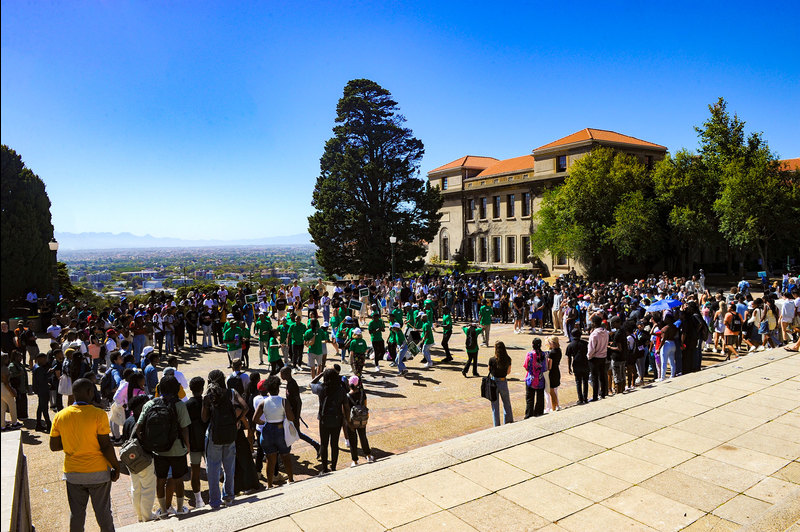Climate change app closes the gap between intention and action
13 March 2023 | Story Helen Swingler. Photo Lerato Maduna. Read time 6 min.
On Wednesday, 15 March, the University of Cape Town (UCT) will join thousands of citizens around the world working to mitigate climate change when the Climate Campaigners app is launched to its community.
The app is a global climate action tool that integrates behavioural and social science insights and grassroots action. It uses behavioural science to work with people’s biases and humanity. Low-key and non-invasive, the app helps those committed to living responsibly and sustainably marry their good intentions and lifestyle changes by proposing specific actions to achieve their goals.
The Climate Campaigners app launch will take place on the Plaza on upper campus from 09:00 to 15:00, and staff and students are invited to visit the Climate Campaigners gazebo for more information. The Climate Campaigners team will explain how the app works and how to choose a Climate Campaigners challenge that’s easy to achieve – and meaningful.
It could be eating less meat (diet), recycling regularly (waste), swapping bulbs for LED lights (energy), or cycling to the shop (mobility).
Climate Campaigners decide whether to have the app to track their progress and offer suggestions or weekly report backs, or prompt them to share progress at the end of the week.
Those who download the app can play games and also stand the chance to win prizes when they choose a Climate Campaigners challenge. Prizes range from mountain bikes to vegetarian food vouchers. Student or staff cards are essential.
A little goes a long way
The initiative at UCT is led by Energy Systems Research Group senior researchers, Grant Smith and Alison Hughes, with help from master’s student Josie McCann, and PhD candidate Julia Tatham. A large part of Smith’s research tries to apply behavioural economics to city-level problems, often leveraging big administrative data. Hughes is an engineer with a keen interest in sustainability and residential energy consumption.
A big question for most people is how an individual can make a difference. Climate change has already caused alarmingly high sea and land temperatures, and in South Africa is almost certainly contributing to deeper droughts and flooding rains. The current carbon-intensive model of global economic growth is unsustainable.
“Everyone I meet has noble incentives and goals. But then comes a disjuncture between intentions and action.”
“We’re facing temperature deviations from the mean that are just so stark,” said Smith. “And it’s a huge spike. Most people, certainly in a university, are likely to accept that our climate is changing in unusual and unnatural ways and that human activity and behaviour are the major causes. Everyone I meet has noble incentives and goals. But then comes a disjuncture between intentions and action in our personal lives.”
Trans-continental initiative
Climate change is humanity’s largest crisis. Policymakers, corporations, and other institutions may be at the forefront of mitigation efforts, but science institutes, cities and municipalities, civil society organisations and digital entrepreneurs must play their part. On the ground, it needs society and citizens to work together to change awareness and behaviour.
Here, Climate Campaigners taps into a broader global network. The initiative is a European Union Horizon 2020-funded co-created project involving 14 cities in 10 countries on four continents. The app is being translated into 10 languages. The headquarters are the energy research centre at The Johannes Kepler University in Austria.
The UCT team is working closely with the City of Cape Town’s Sustainable Energy Markets directorate, which is keen to roll out the app city-wide, and will also be supporting the roll-out on UCT’s campus.
Tapping into sustainability
The Climate Campaigners initiative also fits squarely within the sustainability element of UCT’s Vision 2030. The UCT team is working closely with other campus initiatives in this area: the Khusela Ikamva (“Secure the Future”) Sustainable Campus Project, a collaborative, cross-disciplinary, five-year research-based project to create a sustainable campus, and the Green Campus Initiative.
“It needs tens, then hundreds, then thousands, then millions, and then billions of us making these small decisions and changes.”
A big question for most people is how meaningful individual efforts are. But incremental change across the world adds up quickly, said Smith. “There’s no way we are going to change the status quo without that happening. It needs tens, then hundreds, then thousands, then millions, and then billions of us making these small decisions and changes. That’s another reason the app is so specific and the goals so achievable.”
He added, “We also consider that people are busy and so we want to work with the little bit of attention that they can give to this area.”
Research – what works or doesn’t
There is something for universities too. The back-end of the app has a strong research component, said Smith.
“These campaigns do have a role, so we are interested in researching what works to help people follow through. There are many active questions around this area and there’s still a lot we need to learn about this. We want to find out what works and what doesn’t.”
The pooled information from partners in the 24 participating countries will help to identify the co-benefits of climate-friendly lifestyle choices and behaviours, and impactful policies.
“And once people start making these small changes, and enough of them do it across all spheres of life, the market will respond,” said Smith.
“All of us want to make a positive impact on the planet. All of us have busy lives. And we want to connect with students and staff on that basis.”
 This work is licensed under a Creative Commons Attribution-NoDerivatives 4.0 International License.
This work is licensed under a Creative Commons Attribution-NoDerivatives 4.0 International License.
Please view the republishing articles page for more information.










